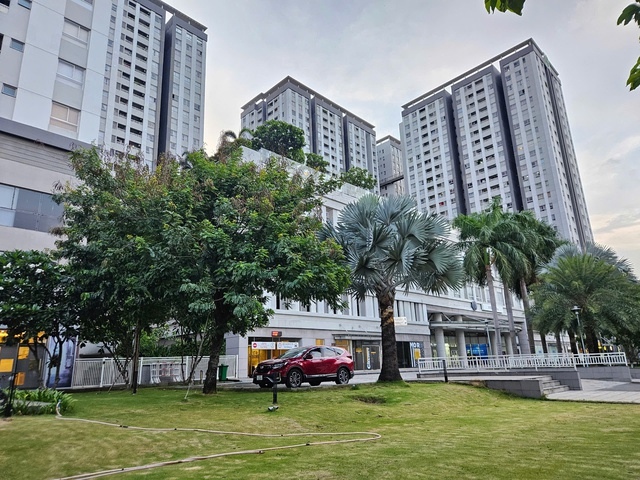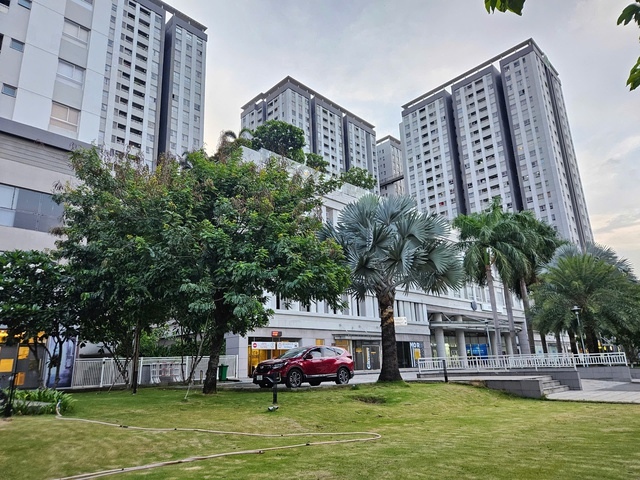“Mortgage Lending Market Booms with Competitive Packages”
The mortgage lending market is buzzing with activity as commercial banks introduce a plethora of attractive loan packages totaling tens of thousands of billions of VND at record-low interest rates starting from 3.88%/year.
A Flood of Competitive Loan Packages
In early May 2025, posing as a prospective home buyer, Vietnam Labour Reporter journalists approached several commercial banks to inquire about their promotional loan offerings. At VietBank, a staff member promoted their “0% Interest Rate Loan – Unlocking Opportunities” package, featuring an ultra-low interest rate of 3.99%/year, a maximum repayment period of 380 months, and a 60-month grace period for principal repayment. The bank also offered a special program for customers purchasing apartments in affiliated projects, with the first month’s interest waived and an 8%/year interest rate applied for the next 11 months of the first year. Following the promotional period, the interest rate would be adjusted periodically depending on the loan term.
Agribank is also in the game with its promotional program valid until the end of 2025, targeting individual borrowers under 35 years old who are civil servants, public employees, or workers. Customers can use the intended property as collateral, enjoying a fixed interest rate of 5.5%/year for the first three years, a loan limit of up to 75% of the required capital, and a maximum repayment period of 40 years. Notably, borrowers are exempt from principal repayment for the first 60 months.
 Soaring real estate prices have been a barrier, diminishing the impact of promotional loan packages. Photo: LAM GIANG |
Numerous other banks, including ACB, BIDV, Vietcombank, VIB, VPBank, HDBank, MB, SHB, and LPBank, are also offering promotional credit packages with initial interest rates of 3.88% or 3.99%, or a fixed rate of 5.5% for the first 2-3 years. Notably, HDBank provides a loan package for social housing purchases with a repayment period of up to 50 years, enabling individuals with a monthly income of less than VND 15 million to own a home with daily installments as low as VND 200,000, effectively supporting borrowers in managing their finances.
Ms. Dinh Thi Thu Thao, Deputy Director of ACB’s Retail Banking Division, shared that within just two months of launching a promotional loan package for borrowers under 35 years old with interest rates starting from 5.5%/year, ACB has disbursed nearly VND 2,000 billion.
Hoai Nam, a resident of Binh Thanh District in Ho Chi Minh City and a prospective real estate investor, expressed surprise at the abundance of competitive loan packages offered by banks. She is considering purchasing an apartment in Ho Chi Minh City for rental income or investing in land over the long term. “I’ve noticed that some banks are offering extended promotional periods, repayment terms of up to 30-50 years, and even a 5-year grace period for principal repayment. These terms are very attractive, but I haven’t found suitable real estate yet, partly because property prices have risen rapidly in a short period,” Nam shared.
Floating Interest Rate Risks
While these promotional loan packages present opportunities, experts caution that borrowers still face risks associated with floating interest rates after the promotional period. Typically, the packages include a clause stating that the interest rate after the promotional period will be based on the 12-month deposit interest rate plus a margin of 3.5%-5%, resulting in a range of 11%-13%/year. For long-term home loans, typically spanning over 20 years, floating interest rates can impose significant financial strain if borrowers don’t plan carefully.
Ms. Dinh Thi Thu Thao explained that large banks, with stable funding sources, usually determine the interest rate after the promotional period based on 12 or 24-month deposit rates plus a margin of at least 3%. In contrast, smaller banks might apply floating interest rates or their own published base rates, resulting in significantly higher post-promotional interest rates.
Dr. Nguyen Tri Hieu, a finance expert, warned that floating interest rates pose a significant challenge for borrowers. The repayment burden could increase substantially after the promotional period, especially for households with limited incomes. Therefore, he advised borrowers to ensure that their total debt repayment (principal and interest) does not exceed 50%-60% of their monthly income to avoid risks. If this ratio reaches 70%-80%, borrowers will face considerable pressure if floating interest rates surge. “Borrowers should carefully study the terms and conditions, including the interest rate adjustment mechanism, early repayment fees, and other associated costs, to avoid falling into an interest rate ‘trap,'” emphasized Mr. Hieu.
Dr. Le Dat Chi, from the University of Economics in Ho Chi Minh City, suggested that banks might shift interest rate risks to borrowers when funding costs increase. To mitigate this risk, he recommended borrowers choose large banks with stable funding sources and transparent loan conditions to ensure reasonable post-promotional interest rates. Comparing loan packages, understanding the interest rate margin after the promotional period, and considering associated costs are crucial factors borrowers should carefully consider.
However, Ms. Dinh Thi Thu Thao assessed that the home loan market has witnessed improvements. Banks are not only competing on interest rates but also providing added value, such as legal advice, expanded loan conditions, flexible repayment timing, and tailored repayment plans. “If the post-promotional interest rate is too high, customers can transfer their loan to another bank with better terms,” advised Ms. Thao.
|
Credit Growth Falls Short of Expectations In 2025, the banking sector set a credit growth target of approximately 16%, equivalent to VND 2.5 quadrillion injected into the market. According to the State Bank of Vietnam, as of mid-April 2025, credit growth across the system reached about 3.95% compared to the end of 2024. Specifically, in Ho Chi Minh City, total credit outstanding for real estate as of the end of February 2025 accounted for approximately 28% of the city’s total credit balance, an increase of 1.15% compared to the end of last year. Within this, housing loans (including social and commercial housing) increased by 0.67%. However, despite banks actively promoting home loans, the growth rate has not met expectations. Mr. Le Huu Nghia, Chairman of Le Thanh Trading Construction Company, attributed this to a lack of supply. The demand for capital to buy real estate is substantial, and banks have ample funds, but the number of new projects entering the market is limited. “The biggest obstacle remains the legal procedures for projects. Despite efforts to address this issue, there are still challenges in implementing policies in practice. It is unlikely that many projects will complete the necessary procedures and be ready for sale in 2025, and we may have to wait until 2026 for new products. With limited supply, banks’ disbursement of capital will also struggle to increase significantly,” analyzed Mr. Nghia. |
THY THO – LAM GIANG
“No Equity Issuance to Existing Shareholders in 2025-2027”
On May 9, 2025, DXG Corporation (HOSE: DXG) held its 2025 Annual General Meeting of Shareholders with a participation rate of 51.27% of the total outstanding shares as of 8:30 am.
The Power of Perseverance: Shark Le Hung Anh’s Story of Overcoming Judgment and Achieving Success
“Two years ago, Shark Le Hung Anh’s statement about being a ‘lesser grey broker’ stirred up a frenzy in brokerage forums. Now, a story he shared about wearing broken sandals to buy a house and being ignored by brokers who assumed he couldn’t afford it has resurfaced and captured attention once again.”





















